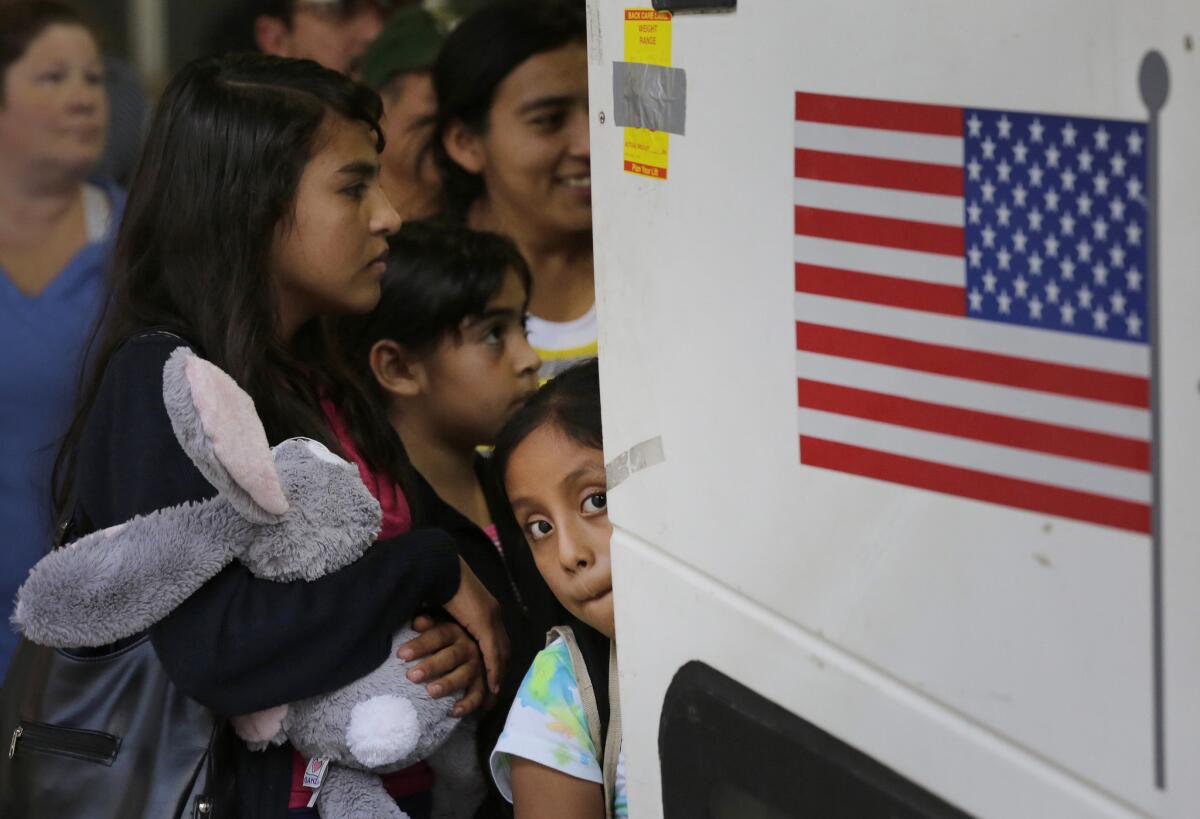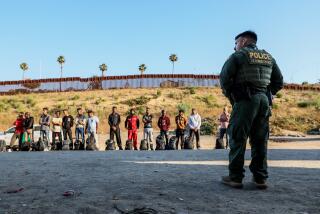Detained immigrant mothers and children trapped in legal limbo

Salvadoran and Guatemalan immigrants who entered the U.S. illegally board a bus after being released from a family detention center in San Antonio.
Hundreds of immigrant families remained locked up and in limbo this week after attorneys for the Obama administration resisted a judge’s order concerning the increasingly controversial family detention system the attorneys appear determined to defend.
The administration’s latest response came after U.S. District Judge Dolly Gee in Los Angeles in late July in effect ordered the release of all children from family detention centers, as well as mothers not deemed flight or national security risks.
In her ruling, Gee found that detaining children who immigrated illegally with or without a parent at the centers violated standards set out in the Flores vs. Meese settlement in 1997. She called conditions at the centers “deplorable.”
Immigrant advocates have filed complaints and lawsuits concerning medical and legal services at the centers, and more than 170 House Democrats have demanded they close.
“It’s disappointing that the administration continues to push to jail women and children seeking asylum,” Rep. Zoe Lofgren (D-San Jose), one of the most outspoken congressional opponents of the detentions, wrote in response to the government’s filing.
“The writing is on the wall — family detention is unacceptable, un-American, and will end. Rather than fight the court’s ruling, the right and moral response is to swiftly take the necessary steps to bring our nation’s detention policy in line with the Flores settlement agreement,” she wrote.
In their response filed late Thursday night, Justice Department lawyers urged the judge to reconsider her ruling, arguing that the facilities had improved in recent weeks and were being transformed into short-term “processing centers.”
U.S. Immigration and Customs Enforcement, which runs the family detention centers with contractors, now aims to hold immigrants with credible asylum claims no longer than 20 days, and most are being released within about two to four weeks. This week, according to an ICE spokesman, about 1,400 parents and children were being held at the country’s three immigrant family detention centers, two in Texas and one in Pennsylvania.
Further limits on family detention time or a shutdown, the government lawyers said, “would heighten the risk of another surge in illegal migration … by incentivizing adults to bring children with them on their dangerous journey as a means to avoid detention and gain access to the interior of the United States.”
In another immigration case, a federal judge in Washington issued an injunction in February barring the government from detaining immigrants as a
way of deterring other migrants.
More than 68,000 family members were caught crossing the U.S.-Mexico border last fiscal year. Some were apprehended while attempting to sneak into the U.S., while others surrendered to border enforcement officials and requested asylum, which is within their rights under U.S. and international laws.
The Justice Department attorneys asked for another chance to argue their case before Judge Gee later this month, noting the “potentially far-reaching scope of the remedies proposed” in her ruling, which gave the administration 90 days to comply.
Peter Schey, one of the lead attorneys for the other side and president of the Los Angeles-based nonprofit Center for Human Rights and Constitutional Law, said they planned to file a response to the government in a week and the judge was expected to rule a week later, probably against the government.
“They are requesting that the court completely rewrite the Flores settlement, and they have no factual basis for that — there is no surge; there has not been a surge for quite some time,” Schey said, calling the government’s position legally and morally “indefensible.”
Laura Lichter, a Denver-based immigration lawyer who has been volunteering at the family detention center in Dilley, Texas, said the Justice Department portrayed a “kinder, gentler” form of family detention that doesn’t match what she has seen, even with recent policy changes and promised improvements.
“The type of detention being described in this response simply doesn’t exist,” said Lichter, past president of the American Immigration Lawyers Assn.
She cited long-standing problems with legal, medical and other services that have led to complaints and lawsuits by those in family detention.
“There are continuing medical issues happening on a daily basis” at the centers, Lichter said. “It is baffling that the government has dug in and dug in so deep to this process of detaining families.”
Gee has indicated she plans to issue an injunction requiring the Department of Homeland Security to adhere to the Flores settlement.
Such a move is opposed by Mark Krikorian, executive director for the Center for Immigration Studies, a Washington group that is fighting illegal immigration and wants more restrictions on legal immigration.
“The judge is acting irresponsibly, in my opinion,” he said, “because the government’s ability to enforce immigration laws is at the core of … sovereignty.”
molly.hennessy-fiske@latimes.com
cindy.carcamo@latimes.com
Hennessy-Fiske reported from Houston and Carcamo from Los Angeles.
More to Read
Sign up for Essential California
The most important California stories and recommendations in your inbox every morning.
You may occasionally receive promotional content from the Los Angeles Times.












